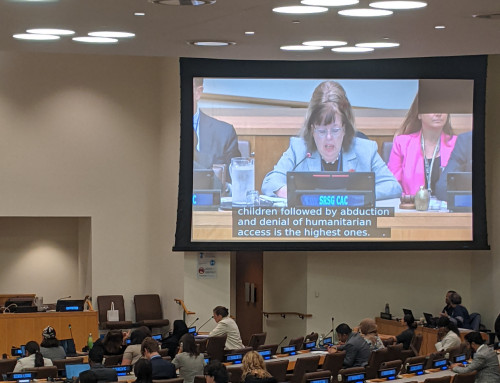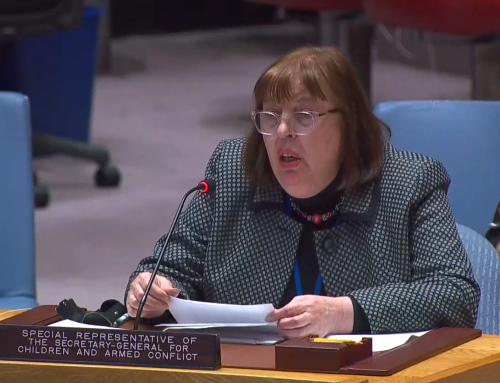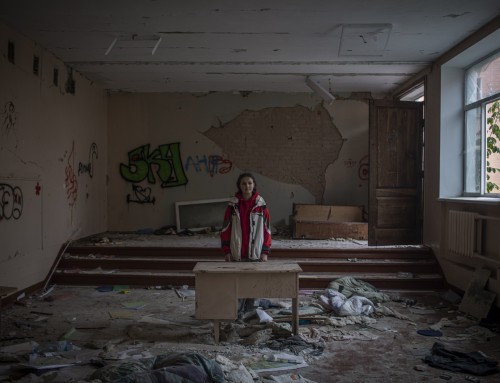Statement by Ms. Leila Zerrougui,
SRSG for Children and Armed Conflict
21 June 2016
Event commemorating the first International Day for the Elimination of Sexual Violence in Conflict
United Nations, New York
Please check against delivery
A year ago, we celebrated the establishment of an international day for the elimination of sexual violence in conflict.
I am honoured to be here today with friends and distinguished panellists and would like to thank Susana Malcorra, Foreign Minister of Argentina, Ambassador, Mr. Martín Garcia Moritán, Permanent Representative of Argentina, for organizing this event to raise awareness about sexual violence in conflict.
I join those who spoke before me, in expressing my gratitude to the General Assembly, civil society, our colleagues from the United Nations and all who work tirelessly to support the survivors of sexual violence. I am glad we now have an international day to recognize the incredible work accomplished, and to reflect on what still needs to be done to end this scourge and to hold perpetrators accountable.
We have come a long way. It’s undeniable. Today’s sentencing of Jean-Pierre Bemba proves it. But, unfortunately, sexual violence continues to be widespread. It is also still taboo in almost every society. And even more sensitive when it affects children and teenagers.
As defined in the mandate I represent, “rape and other forms of sexual violence” is one of six grave violations we monitor and report on. With the adoption of Security Council resolution 1882 in 2009, it is also a trigger for the inclusion of parties to conflict in the annexes of the Annual report of the Secretary-General on children and armed conflict.
The latest report, covering 2015, documents cases of sexual violence affecting children in 16 out of 20 conflict situations on the CAAC agenda. There are 14 parties to conflict listed for sexual violence: Government forces and non-State armed groups.
Unfortunately, as the report notes, it is difficult or impossible to verify each- incident of sexual violence brought to the UN’s attention. Even worse, in many situations of conflict, we know it is happening, but the information is not available. This means two equally tragic things: 1) sexual violence remains underreported, and 2) survivors – some as young as 9 or 10 years old – do not come forward and are therefore not receiving the help they desperately need to heal, overcome trauma and reclaim their lives.
In most countries affected by conflict, children are the majority of the population. We often think of sexual violence as a problem that affects mostly women. Unfortunately, that is not the case. Children—boys and girls—are greatly affected by sexual violence in conflict situations. When we think about measures to end and prevent sexual violence, programmes to help survivors, we must not forget girls and boys, because they need our help.
Excellencies, Ladies and Gentlemen,
Children are an easy target in times of war. They are especially vulnerable to rape and sexual violence. When conflict strikes at the heart of communities, the structures upon which children rely for their protection are frequently fractured.
Too often, they can no longer rely on the protection offered by their family, their school, their church or other religious institutions.
Sexual violence is often associated with other violations such as recruitment and use by parties to conflict or abduction. Each conflict situation is different. But it is undeniable that sexual violence continues to be used as a weapon of war by parties to conflict. Rape and the threat of rape are used to create a climate of fear in communities. It is used to retaliate against an enemy, to intimidate, to humiliate or to impose an ideology, to grab lands and force populations to flee.
Girls are abducted from their homes or schools, taken to the bush where they are forced to become child soldiers and sex slaves, or married to local commanders. As a recent MONUSCO report on the recruitment of girls by armed groups stated, they are invisible victims. We often discover their stories only when they escape. As the report illustrated, too often, the fear of stigma pushes girls to stay with their abusers, especially when they find themselves mothers of children born of rape.
Girls are not the only child victims of sexual violence. Most of us are familiar with the practice of Bacha Bazi, in which young boys are used as sexual slaves by men in power, police and military commanders. Boys recruited as child soldiers or held in detention can also be subjected to rape or to threats of sexual violence.
Children’s vulnerability is exacerbated when they are displaced and living in camps, where precarious security conditions create an environment conducive to sexual violence.
Ladies and gentlemen,
It won’t surprise anyone – impunity is one of the biggest obstacles to ending sexual violence in conflict. Soldiers, members of armed groups, members of communities, will continue to commit these crimes if they are not held to account.
Without accountability, without a clear signal to perpetrators that they cannot continue unpunished, there are few prospects that we will see the end of it. Also, collectively we must provide and protect the space in which the survivors of sexual violence can speak out, report to the authorities, testify in a court or seek medical care without fear, stigmatisation or, worse, reprisals. Survivors should be encouraged to speak about what happened to them. We have to work with communities to end the stigma attached to sexual violence. We also need to make sure that survivors are given all the support and assistance they need to heal and rebuild their life in a dignified manner. Reparations are another important aspect. Think about the conviction of Chad’s former President Hissene Habré for torture based on facts of sexual violence, and rape and sexual slavery as crimes against humanity, it would never have happened without the courageous testimony of Khadija Hassan Zidane one of his victims in the tribunal.
Excellencies, Ladies and Gentlemen,
A year ago, I expressed the hope that this annual commemoration will serve as a global call to action for security, justice and service on behalf of survivors of sexual violence in conflicts all over the world. In the past months, we have begun to see encouraging signs that impunity is coming to an end.
Today, let’s renew our shared commitment. Let’s pledge that child survivors of sexual violence will be given the means and support to rebuild their lives, ideally with their families and communities
Our challenge is to translate advocacy and political will into more concrete actions and more protection on the ground for all victims of sexual violence, including girls and boys.
The victims and survivors count on all of us.
Thank you.





